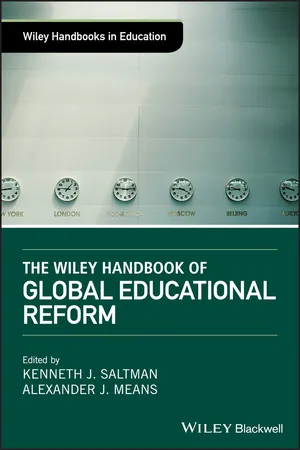
The Wiley Handbook of Global Educational Reform
- English
- ePUB (mobile friendly)
- Available on iOS & Android
The Wiley Handbook of Global Educational Reform
About This Book
The Wiley Handbook of Global Educational Reform examines educational reform from a global perspective. Comprised of approximately 25 original and specially commissioned essays, which together interrogate educational reform from a critical global and transnational perspective, this volume explores a range of topics and themes that fully investigate global convergences in educational reform policies, ideologies, and practices.
The Handbook probes the history, ideology, organization, and institutional foundations of global educational reform movements; actors, institutions, and agendas; and local, national, and global education reform trends. It further examines the "new managerialism" in global educational reform, including the standardization of national systems of educational governance, curriculum, teaching, and learning through the rise of new systems of privatization, accountability, audit, big-data, learning analytics, biometrics, and new technology-driven adaptive learning models. Finally, it takes on the subjective and intersubjective experiential dimensions of the new educational reforms and alternative paths for educational reform tied to the ethical imperative to reimagine education for human flourishing, justice, and equality.
- An authoritative, definitive volume and the first global take on a subject that is grabbing headlines as well as preoccupying policy makers, scholars, and teachers around the world
- Edited by distinguished leaders in the field
- Features contributions from an illustrious list of experts and scholars
The Wiley Handbook of Global Educational Reform will be of great interest to scholars and graduate students of education throughout the world as well as the policy makers who can institute change.
Frequently asked questions
Information
1
Capitalism and Global Education Reform
Introduction
Schools Are Failures and Teachers Are to Blame
Our nation is at risk. Our once unchallenged preeminence in commerce, industry, science, and technological innovation is being overtaken by competitors throughout the world … If an unfriendly foreign power had attempted to impose on America the mediocre educational performance that exists today, we might well have viewed it as an act of war. (1983, p. 9)
Dominant Discourses
Table of contents
- Cover
- Table of Contents
- Introduction: Toward a Transformational Agenda for Global Education Reform
- 1 Capitalism and Global Education Reform
- 2 The Business Sector in Global Education Reform: The Case of the Global Business Coalition for Education
- 3 Venture Philanthropy and Education Policy‐Making: Charity, Profit, and the So‐Called “Democratic State”
- 4 Nodes, Pipelines, and Policy Mobility: The Assembling of an Education Shadow State in India
- 5 Reframing Teachers’ Work for Global Competitiveness*: New Global Hierarchies in the Governing of Education
- 6 School Principals in Neoliberal Times: A Case of Luxury Leadership?
- 7 The Expansion of Private Schooling in Latin America: Multiple Manifestations and Trajectories of a Global Education Reform Movement
- 8 Global Education Policies and Taken‐For‐Granted Rationalities: Do the Poor Respond to Policy Incentives in the Same Way?1
- 9 The Politics of Educational Change in the Middle East and North Africa: Nation‐Building, Postcolonial Reconstruction, Destabilized States, Societal Disintegration, and the Dispossessed
- 10 Profiting from the Poor: The Emergence of Multinational Edu‐Businesses in Hyderabad, India1
- 11 The Bait‐and‐Switch and Echo Chamber of School Privatization in South Africa
- 12 The Violence of Compassion: Education Reform, Race, and Neoliberalism’s Elite Rationale
- 13 Uncommon Knowledge: International Schools as Elite Educational Enclosures
- 14 Startup Schools, Fast Policies, and Full‐Stack Education Companies: Digitizing Education Reform in Silicon Valley
- 15 Who Drives the Drivers?: Technology as the Ideology of Global Educational Reform
- 16 Resurgent Behaviorism and the Rise of Neoliberal Schooling
- 17 Educating Mathematizable, Self‐Serving, God‐Fearing, Self‐Made Entrepreneurs
- 18 Putting Homo Economicus to the Test: How Neoliberalism Measures the Value of Educational Life
- 19 EcoJust STEM Education Mobilized Through Counter‐Hegemonic Globalization
- 20 When the Idea of a Second Grade Education for the Marginalized Becomes the Dominant Discourse: Context, Policy, and Practice of Neoliberal Capitalism
- 21 Financial Literacy and Entrepreneurship Education: An Ethics for Capital or the Other?
- 22 The Socially Just School: Transforming Young Lives
- 23 Beyond Neoliberalism: Educating for a Just Sustainable Future
- 24 When Schools Become Dead Zones of the Imagination: A Critical Pedagogy Manifesto
- Index
- End User License Agreement